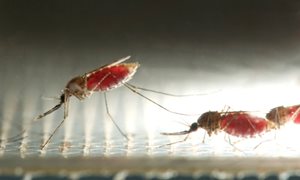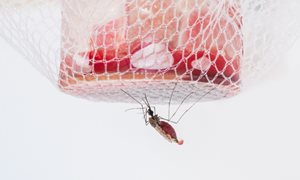 Adding ‘repurposed’ antiparasitic drug to community-wide campaigns with antimalarial treatment could boost impact by up to 61%. Results are published in The Lancet Infectious Diseases on Wednesday March 28th.
Adding ‘repurposed’ antiparasitic drug to community-wide campaigns with antimalarial treatment could boost impact by up to 61%. Results are published in The Lancet Infectious Diseases on Wednesday March 28th.
What’s more, transmission modelling to predict the potential impact of this approach indicates that pairing high-dose ivermectin with a standard malaria treatment (dihydroartemisinin-piperaquine) in community-wide campaigns, such as mass drug administration, could reduce malaria prevalence by up to 61% more than campaigns with only antimalarials. In areas of low prevalence, where 10% of the population is infected, adding ivermectin could reduce prevalence to <0.1% for more than 6 months.
These results are further evidence of the potential of ivermectin to become a powerful new tool to aid malaria elimination efforts, say the authors.
430.000 deaths a year
In sub-Saharan Africa, the malaria parasite Plasmodium falciparum kills 430,000 people every year— 80% of deaths are in Africa, mostly in children under the age of 5. Resistance to insecticides is rising, and mosquitoes are adapting their behaviour to feeding outdoors to escape the killing effects of insecticide-treated nets and indoor residual spraying.
Discovered 30 years ago, more than 2.5 billion doses of ivermectin have been given across Africa and Latin America to kill parasitic worms, including those that cause river blindness and lymphatic filariasis, and has been shown to be safe. A single dose of 300–400 µg/kg is recommended when these mass drug administrations are done yearly, but ivermectin has safely been used in doses up to 2000 µg/kg.
Previous research has shown that ivermectin, even at very low levels, is toxic to Anopheles mosquitoes that spread malaria. Laboratory studies indicate that mosquitoes die or are too weakened to pass on the malaria parasite if they feed on recently treated individuals. However, earlier research showed that the mosquito-killing effects of standard doses (150-200µg/kg) are less than 7 days.
Feeding blood
This randomised trial conducted at the Jaramogi Oginga Odinga Teaching and Referral Hospital in Kisumu, Kenya included 141 adults (aged 18-50 years) with uncomplicated P falciparum malaria. Participants were randomly assigned to receive dihydroartemisinin-piperaquine (DP) plus either 3 days of ivermectin 600 µg/kg per day (47 participants), ivermectin 300 µg/kg per day (48), or placebo (46). The researchers fed the patients’ blood at regular intervals to laboratory-reared Anopheles mosquitoes, and assessed mosquito survival every day for 28 days after feeding. 128 participants (91%) attended a visit 7 days after treatment and were included in the main analysis.
Seven days after treatment, mosquitoes died 4-times faster after being fed blood from participants who received the lower dose ivermectin (300 µg/kg per day) treatment compared to those fed on blood from participants given placebo. This mosquito mortality rate was 6-times higher after treatment with the higher dose of ivermectin (600 µg/kg per day) than placebo. During the two weeks after feeding, 41% of mosquitoes died in the placebo arm, compared to 93% and 97% of mosquitoes killed in the 300 and 600 µg/kg/day arms, respectively. The effect on mosquito mortality remained significantly higher 28 days after treatment with both ivermectin doses compared with placebo.
Ivermectin was well-tolerated at both doses with two serious treatment-related side effects reported—an anaphylactic reaction in the 300 μg/kg/day group, and a transient disruption of the heart's normal electrical activity likely resulting from the antimalarial DP in the 600 μg/kg/day group. The majority of adverse events were mild or moderate, with 5/45 (11%) participants reporting at least one treatment-related adverse event in the 600 µg/kg/day dose group, 2/48 (4%) in the 300 µg/kg/day dose group, and none in the placebo group. The most common reactions were mild, short-lived dose-dependent visual disturbances during drug administration.
Population-level modelling suggests that adding high doses of ivermectin for 3 days to mass drug administration with DP could reduce malaria prevalence by an additional 56% (600 µg/kg/day dose) and 44% (300 µg/kg/day dose) in low transmission areas—enhancing the likelihood of achieving local elimination—and by 61% and 54% respectively in high transmission areas like sub-Saharan Africa.
Limitations
The authors note several limitations, including that the study only included individuals with symptomatic malaria, so the findings might not be generalisable to mass drug administration campaigns that target the entire population—most of whom are either asymptomatic or uninfected. They also note that standard laboratory-reared mosquitoes known to be sensitive to pyrethroids and other classes of insecticides were used, which might not reflect wild populations. Lastly, they highlight that studies of the safety, tolerability, and efficacy of high doses of the drug will need to be done in children, and as multiple rounds, before its effect on malaria transmission can be assessed in community-wide campaigns.
“This is the first study to show the safety and efficacy of multiple high-doses of ivermectin on mosquito mortality”, says Dr Menno Smit from the Liverpool School of Tropical Medicine, Liverpool, UK, who led the study. “Our results suggest that a 300 µg/kg dose of ivermectin each day for 3 days would provide a good balance between efficacy and tolerability.”
“Despite these encouraging findings, further rigorous safety and efficacy trials in younger age groups are needed before high-dose ivermectin can be administered at scale to assess its impact on malaria transmission and human health”, says Smit. Co-author Teun Bousema (theme Infectious diseases and global health) from Radboud university medical center adds that, “high-dose ivermectin may also have potential applications in other vector-borne diseases transmitted by mosquitoes including Zika virus, dengue, and West Nile fever, as well as insect- and tick-borne disease like sleeping sickness and Lyme disease. Further studies should be done to assess the use of high-dose ivermectin against these insects.”
Writing in a linked Comment, Dr Regina Rabinovich from the Harvard T H Chan School of Public Health, Boston, USA says: “Given the high variability of the vector and the parasite, more than one approach will probably be needed to confront this challenge. Studies to repurpose ivermectin could be completed by 2022 if financed soon, and this would provide a short term option for the field. If ivermectin is effective, new endectocides that could safely provide similar benefits with improved characteristics like longer duration of action, could be developed.”
-
Want to know more about these subjects? Click on the buttons below for more news.
Related news items

Computer determines the right dosage of antibiotics for ICU patients PhD thesis defense of Eveline Wallenburg on August 29 at 2:30 p.m.
29 August 2022One third of patients with an infection in the intensive care unit die. In her thesis 'Revisiting antimicrobial therapy in critically ill patients through pharmacometrics', Eveline Wallenburg shows that intensive care patients often receive the wrong dosage of antibiotics.
go to page.aspx?width=800&height=533&ext=.jpg&type=BlockColumn1Zoom1)
New test for Lyme disease is not reliable
15 June 2022 To determine whether someone has Lyme disease, doctors in the Netherlands often use antibody tests. For some time now, so-called cellular tests have been available on the market. However, the VICTORY study published in The Lancet Infectious Diseases has found that these tests are not reliable. go to page
With concerted effort, tuberculosis could be eradicated in 30 years time March 24th was World Tuberculosis Day
24 March 2022 Since 2020, the number of deaths from tuberculosis increased for the first time in a decade, caused by the COVID pandemic: fewer people had access to the right care on time. Some catching up is needed. go to page
NIH grant for follow-up research on tuberculous meningitis
10 February 2022Met subsidie van het Amerikaanse NIH gaat With a grant from the U.S. NIH, Reinout van Crevel will continue to unravel the disease process of tuberculous meningitis.
go to page

